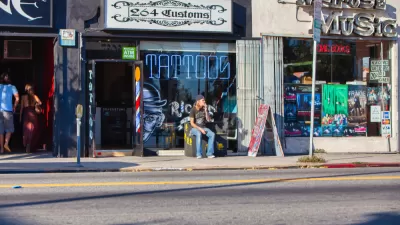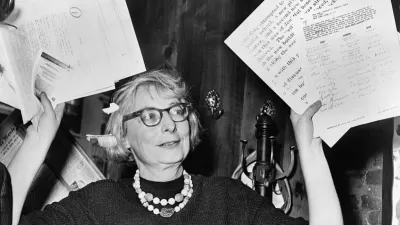Elizabeth Farrelly poses that as we get more connected via the internet and social networking, the female traits of connectivity and relationship-building are ascendant and may mean a new feminine paradigm for city-building.
Farrelly argues that as we leave the suburban model (which separated female and male activities, relegating women to unimportant activities) behind and life and work become more about networking and connectivity, we are moving towards a more "female-formed city":
"The principles of urbanism - intricate connectivity, engagement with history, a focus on the slow, the pedestrian, the being there (as opposed to the getting there) - are feminine values. So, it should be no surprise that many of the voices of this ''new'' urban movement, from Jane Jacobs onward, are female," writes Farrelly.
Her belief is a female-formed city would be less tall and would be "...crazed with interconnecting laneways and gardens and courtyards, lots of shared spaces..."
FULL STORY: Gender and the city

Planetizen Federal Action Tracker
A weekly monitor of how Trump’s orders and actions are impacting planners and planning in America.

Map: Where Senate Republicans Want to Sell Your Public Lands
For public land advocates, the Senate Republicans’ proposal to sell millions of acres of public land in the West is “the biggest fight of their careers.”

Restaurant Patios Were a Pandemic Win — Why Were They so Hard to Keep?
Social distancing requirements and changes in travel patterns prompted cities to pilot new uses for street and sidewalk space. Then it got complicated.

Platform Pilsner: Vancouver Transit Agency Releases... a Beer?
TransLink will receive a portion of every sale of the four-pack.

Toronto Weighs Cheaper Transit, Parking Hikes for Major Events
Special event rates would take effect during large festivals, sports games and concerts to ‘discourage driving, manage congestion and free up space for transit.”

Berlin to Consider Car-Free Zone Larger Than Manhattan
The area bound by the 22-mile Ringbahn would still allow 12 uses of a private automobile per year per person, and several other exemptions.
Urban Design for Planners 1: Software Tools
This six-course series explores essential urban design concepts using open source software and equips planners with the tools they need to participate fully in the urban design process.
Planning for Universal Design
Learn the tools for implementing Universal Design in planning regulations.
Heyer Gruel & Associates PA
JM Goldson LLC
Custer County Colorado
City of Camden Redevelopment Agency
City of Astoria
Transportation Research & Education Center (TREC) at Portland State University
Camden Redevelopment Agency
City of Claremont
Municipality of Princeton (NJ)





























